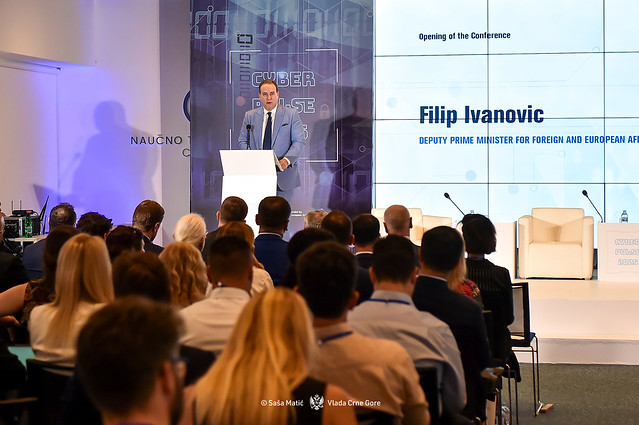Cybersecurity: A Matter of Sovereignty and European Progress
Today in Podgorica, the Deputy Prime Minister for Foreign and European Affairs Filip Ivanović inaugurated the inaugural regional conference on cybersecurity, titled WB CyberPulse 2025: Tracking Progress, Building Resilience, Driving Change.
This conference is organized by the Regional Cooperation Council (RCC) and the European Commission (EC), in partnership with the Western Balkans Cyber Capacity Centre (WB3C). It unites ministers, representatives from national and regional CERT/CIRT/CSIRT teams, EU institutions, international organizations, the private sector, and civil society. The goal of the event is to enhance cybersecurity resilience in the region through structured dialogue, regional coordination, and alignment with European standards.
In his address to attendees, Deputy Prime Minister Ivanović reiterated Montenegro’s commitment to being a trustworthy partner and host for strategic regional dialogues. He emphasized that Montenegro’s European path not only deepens but also incorporates regional responsibilities.
While our region may be small in size, it faces global challenges. Cyber threats transcend borders, testing institutions, infrastructure, and mutual trust. Thus, cybersecurity transcends technical concerns; it is fundamentally about sovereignty, security, and democratic resilience, Ivanović remarked.
He underscored Montenegro’s proactive approach to adopting European standards and enhancing national capabilities, noting that no single nation in the region can tackle today’s challenges in isolation.
We endorse initiatives that foster a unified cyber space where data, knowledge, and individuals can move freely with trust and protection, he added.
Deputy Prime Minister Ivanović further highlighted the significance of the Western Balkans Cyber Capacity Centre, established in Montenegro with the backing of France and Slovenia, serving as a pivotal institutional hub for regional collaboration.
WB CyberPulse 2025 aims to pinpoint current challenges, share best practices, and forge sustainable partnerships. Throughout the one-day program, participants will delve into topics including the role of artificial intelligence in cybersecurity, the inclusion of women and youth, and the essential role of academia in capacity building.
Cybersecurity is emerging as a new form of literacy—a culture of behavior we must construct together: governments, schools, universities, the media, companies, and citizens. Montenegro is poised to serve as both a host and a partner in nurturing this culture, concluded Deputy Prime Minister Ivanović.
The conference was also officially inaugurated by Amer Kapetanović, Secretary General of the Regional Cooperation Council; Michael Docherty, Head of Digital Transformation and Cybersecurity Sector at the European Commission Directorate-General for Enlargement; and Gilles Schwoerer, Director of the Western Balkans Cyber Capacity Centre (WB3C).



